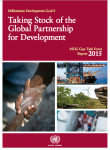The UN MDG Gap Task Force has issued its final report on achievements and gaps in the implementation of Millennium Development Goal (MDG) 8 on a global partnership for development.
The report notes challenges in international cooperation, alongside significant progress toward the MDGs in the past 15 years, and underscores the importance of a new global partnership for development in achieving the proposed Sustainable Development Goals (SDGs).
 18 September 2015: The UN MDG Gap Task Force has issued its final report on achievements and gaps in the implementation of Millennium Development Goal (MDG) 8 on a global partnership for development. The report notes challenges in international cooperation, alongside significant progress toward the MDGs in the past 15 years, and underscores the importance of a new global partnership for development in achieving the proposed Sustainable Development Goals (SDGs).
18 September 2015: The UN MDG Gap Task Force has issued its final report on achievements and gaps in the implementation of Millennium Development Goal (MDG) 8 on a global partnership for development. The report notes challenges in international cooperation, alongside significant progress toward the MDGs in the past 15 years, and underscores the importance of a new global partnership for development in achieving the proposed Sustainable Development Goals (SDGs).
Speaking at the report’s launch, UN Secretary-General Ban Ki-moon stressed that “achieving the SDGs will require an even stronger global partnership, complemented by multi-stakeholder partnerships to mobilize and share knowledge, expertise, technology and financial resources.” Ban expressed his commitment to delivering on unfinished MDG commitments while tackling new challenges through the SDGs, noting major gaps remaining in reducing vulnerabilities for developing countries, including least developed countries (LDCs), land-locked developing countries (LLDCs) and small island developing States (SIDS).
The Task Force – created by Ban in 2007 – is an inter-agency initiative that includes over 30 organizations with competence in the five areas of the global partnership for development: official development assistance (ODA); market access and trade; debt sustainability; access to affordable essential medicines; and access to new technologies. The report, ‘Taking Stock of the Global Partnership for Development,’ presents progress on these five areas.
On ODA, the report finds that ODA increased 66% between 2000 and 2014, particularly to the LDCs, but increased ODA and additional resources will still be necessary to achieve the SDGs. It recommends better targeting resources to the poorest developing countries and promoting innovative uses of ODA, such as using it leverage private finance.
On market access and trade, although developing countries’ access to developed country markets improved from 30.5% to 43.8% between 2000 and 2014, the report highlights persistent challenges in eliminating trade barriers and the failure to conclude the Doha Development Round after 13 years of negotiation. It states that duty-free treatment on developing country exports to developed countries only improved from 65% in 2000 to 79% in 2014.
The report offers “many insights…on what could be helpful in achieving the SDGs,” UN Development Programme (UNDP) Administrator Helen Clark at the launch. She welcomed progress in debt relief and the availability of new technologies but said significant gaps remain even in areas where there has been progress, such as the increase in ODA, which is concentrated in a few countries.
“All available resources need to be mobilized in addition to public financing” to implement the SDGs, said UN Under-Secretary General for Economic and Social Affairs, Wu Hongbo. He called for policy guidance to encourage the private sector to financially support implementation of the new agenda.
Other gaps identified in the report include the lack of quantitative time-bound targets in the five areas, and lack of data to track commitments in a timely manner, as well as a mismatch between targets and indicators selected to measure progress.
The report recommends enhanced global monitoring and improved coordination of partnerships in the post-2015 development agenda. [UN Press Release] [UNDP Press Release] [Publication Website] [UN Secretary-General Statement] [UNDP Administrator Statement] [Publication: Taking Stock of the Global Partnership for Development] [DESA Press Release] [UNRIC Press Release]